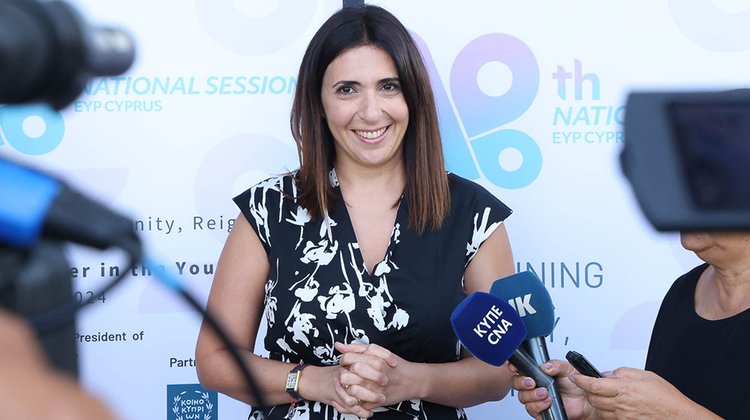Cohesion policy and competitiveness go hand in hand, Raouna says in Brussels
07:44 - 20 November 2024

The role of Cohesion Policy in strengthening competitiveness is one of the issues discussed by member states in Brussels, during the General Affairs Council of the EU, with the participation of Deputy Minister for European Affairs, Marilena Raouna.
The Deputy Minister, in an intervention on 19 November, stressed the need for the Cohesion Policy to continue to promote a holistic approach towards strengthening competitiveness and supporting investment in Member States.
CNA learns that during her intervention, Raouna cited as an example Cyprus and the fact that specificities related to its geographical location are taken into account through the Cohesion Policy, resulting in Cohesion Funds making a substantial contribution to the growth of the economy and investment, boosting GDP growth by 6% and creating more than 20 thousand jobs.
Upon her arrival to the meeting on Tuesday morning, Raouna said the GAC would discuss the role of cohesion policy in competitiveness, the annual dialogue on the state of the rule of law in the Member States, and preparations for the European Council of 19 - 20 December.
Raouna said upon her arrival that in Cyprus “cohesion policy has been instrumental in boosting competitiveness, innovation, entrepreneurship”, and stressed the importance of these policies in efforts to enhance the EU's competitiveness, as it is key in helping Member States bridge disparities.
In her intervention during the meeting, according to sources, Raouna said that Cyprus believes that a holistic approach to cohesion and competitiveness should also guide the negotiations on the new Multiannual Financial Framework.
The Deputy Minister stressed that inequalities between Member States will grow if a strong Cohesion Policy is not intertwined with the deepening of the Single Market and the strengthening of competitiveness. She added that if proposals towards more selective funding in specific areas prevail, this would bring about the downgrading of this approach and would likely affect issues such as the European Green Deal and employment.
Regarding preparations for the next European Council, which was also on the agenda, Raouna said upon her arrival to the meeting to the importance of “continuing our efforts on addressing migration, the implementation of the Pact on Asylum and migration, tackling instrumentalization and smuggling, as well as building strategic partnerships with our partners, which is a key element in addressing migration” which is also related to the situation in the Middle East.
Responding to a question by a journalist on the role of Cyprus in facilitating aid to the Gaza Strip, the Deputy Minister said that Cyprus “is fulfilling its moral responsibility to its immediate region, the Middle East” and added that “we must always remember that Cyprus is an integral part of the Eastern Mediterranean”, which is why it put together the Amaltheia Maritime Corridor “for the delivery of of desperately needed humanitarian assistance to Gaza”.
To do that, she said, Cyprus worked closely with European partners, the European Commission, other countries such as the United States and the United Arab Emirates.
“What I can say is that our work on continuing the delivery of humanitarian assistance through the Cyprus maritime corridor is continuing, in a supplementary manner always to other routes” she added, stressing the primacy of land routes in this regard.
Earlier, Raouna took part in a working breakfast organised by the French Minister for European Affairs, Benjamin Haddad and the Minister of Foreign Affairs of the Netherlands, Caspar Veldkamp, which was dedicated to “boosting our collective efforts to combat antisemitism in light of the recent alarming events”.
“Τhere can be no breathing space for antisemitism in Europe. Cyprus's commitment on combating antisemitism is unwavering as well as all forms of intolerance and discrimination” she noted.
Prior to the beginning of the GAC, a meeting was held between the countries of the Trio of Presidencies of the Council of the EU which includes Cyprus (which takes over the Presidency in the first half of 2026), together with Poland (first half of 2025) and Denmark (second half of 2025), and the countries of the Trio that will succeed them, namely Ireland, Lithuania and Greece.
Poland, Denmark and Cyprus briefed Ireland, Lithuania and Greece on the preparation and negotiation of the common priorities to be promoted from January 2025 to June 2026.
(Source: CNA)
